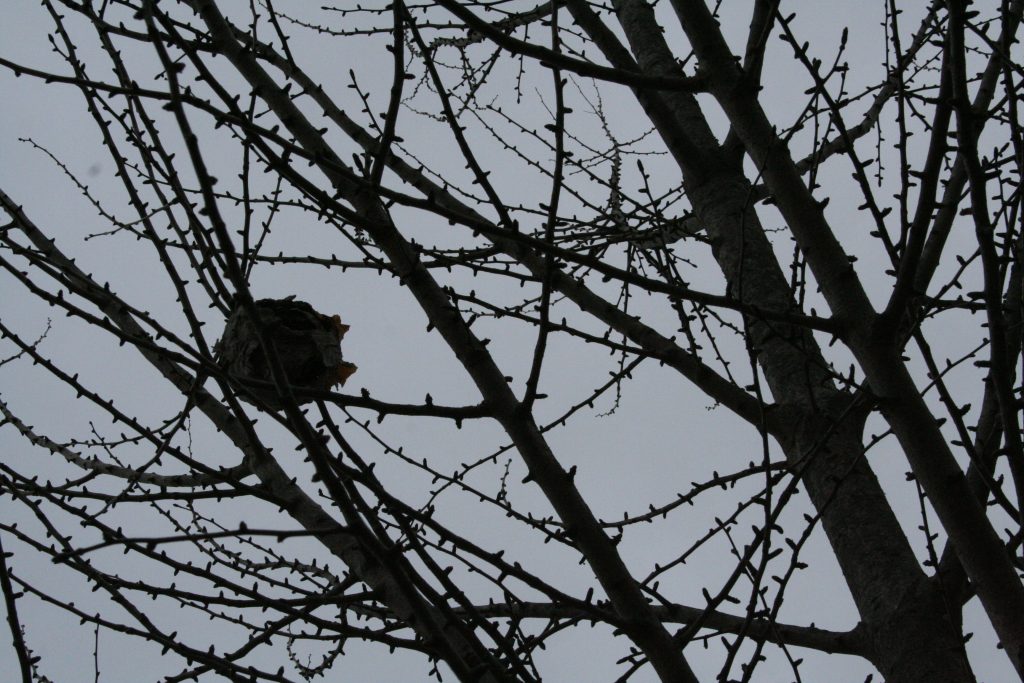
A paper wasp nest at Greenhill Park.
Photo by Marie Roger-Wright.
The Retreat
I sat and watched a man Wednesday search the fallen soldiers’ names etched in the Massachusetts Vietnam Veterans Memorial’s stone columns at Greenhill Park.
Now and then, he would punch one of the names into his phone’s search engine and studied the result.
I had not intended to be at the memorial. I’m a veteran, but I was despondent knowing that the sanctity of Veterans Day observances, like so many other rituals of American identity, had been hollowed out by four years of the Trump presidency.
And this emptiness of the American creed has been jarringly apparent lately.
I felt it watching Trump, the man who called our fallen heroes losers and suckers, laying the traditional wreath at the Tomb of the Unknown Soldier.
And it echoes hauntingly now in the votes of the 70 plus million Americans who still believe this president is a worthy leader of our democracy.
Selling Hope
Yet, I feel obligated to nurture hope, if only for the sake of my children and grandchildren.
And so, when my 10-year-old granddaughter, perhaps influenced by her school activities, asked at the last moment if she could hang out with me on my day, I granted her wish.
She would have been satisfied with some arts and crafts activity, I’m sure. But I was presumptuous in thinking I could teach her a thing or two by taking her to the Vietnam Memorial.
Of course, like everyone who feels cooped up by the coronavirus, she was thrilled with the idea of going out and about.
I imagined she was also confident she would be able to talk me into doing some of the don’ts on her mother’s coronavirus checklist, like allowing her to pay respect to the park’s jungle gym.
And sure enough, as it is with children, the solemnity of the day did not subdue her spirit of adventure once we got to the memorial.
Before long, other occupants of the memorial grounds, like the tadpoles in the reflecting pond, soon invited her attention more than did the memorial’s columns of names.
Thanks For Your Service
She was on the periphery using a camera to capture an exposed wasp nest high in a leafless tree when I turned my attention back to the man searching the names of the fallen.
“Are you a veteran?” I asked.
“No,” he said, identifying himself as Dennis.
“I attended UMass, and I remember there was a lot of protest on campus, but I had my nose to the grindstone because I knew what I had to do.
“Most of my friends, guys that I grew up with, when they graduated from college in 69, that’s when they really had to scramble… (a lot of them) were able in 1969 to get into reserve, or National Guard’s units.”
Pointing to one of the names on the memorial, he said, “This guy right here lived in my neighborhood. He might have been a year younger than I.”
“Then there was a guy I went to UMass with, in 1965, 66,” he continued.
“He was gung-ho, ROTC, so when everyone was protesting and growing their hair long, he was wearing a crew-cut and shiny black shoes, and he was ROTC the whole time, all through four years at UMass.
“He got to Nam in 71, and I don’t think he made it two months.
“I also went with a guy from high school all the way through UMass. I don’t know if he tried hard enough, but he was drafted and survived tough times in Vietnam.
“He was an infantryman, and I guess a pretty skilled rifleman, and he became a sniper. He was dropped off in the middle of the Mekong delta.
“These guys don’t want to talk about it. I’ve never talked to him about it.
“I’m not close to him, despite that we went to high school together and UMass together. I knew I was going to be deferred. Whether he chose to go in, or whether he got drafted, I don’t know.
“There were a whole bunch of Americans who believe they weren’t going to go, no matter what, and they ended up in Canada. They said they were not going for ethical reasons or the simple fear of getting killed.
“Have you been to the Vietnam Memorial in DC? Fifty-eight thousand names. It is moving, and I cry every time I go there.”
As Dennis spoke, I couldn’t help thinking that the hundreds of thousands of Americans who have died in service to their country is perhaps the only unsullied truth of war memorials.
Too Many Wars
Then my granddaughter, as children her age often does, unceremoniously interrupted us.
“Look, grandpa,” she said, showing us a digital image on the camera’s memory card.
“Here is my paper wasp nest.”
I reasoned that she was trying to tell me that living and dying and abandonment are seasons of our lives that matter only in the way we perceive them?
I wish I knew, but the older I get, the less wise it seems I’ve become.
And my presumptuousness in thinking I could teach my granddaughter lessons about things in which I have lost faith surfaced for the second time that day.
The first came during our drive to the park, when we discussed the city’s several memorials and how they preserve the memory of wars and those who fought them.
“We have too many wars,” she had said, matter of factly.
And really, what else is there to say about wars and memorials and our hypocritical attachment to them.
